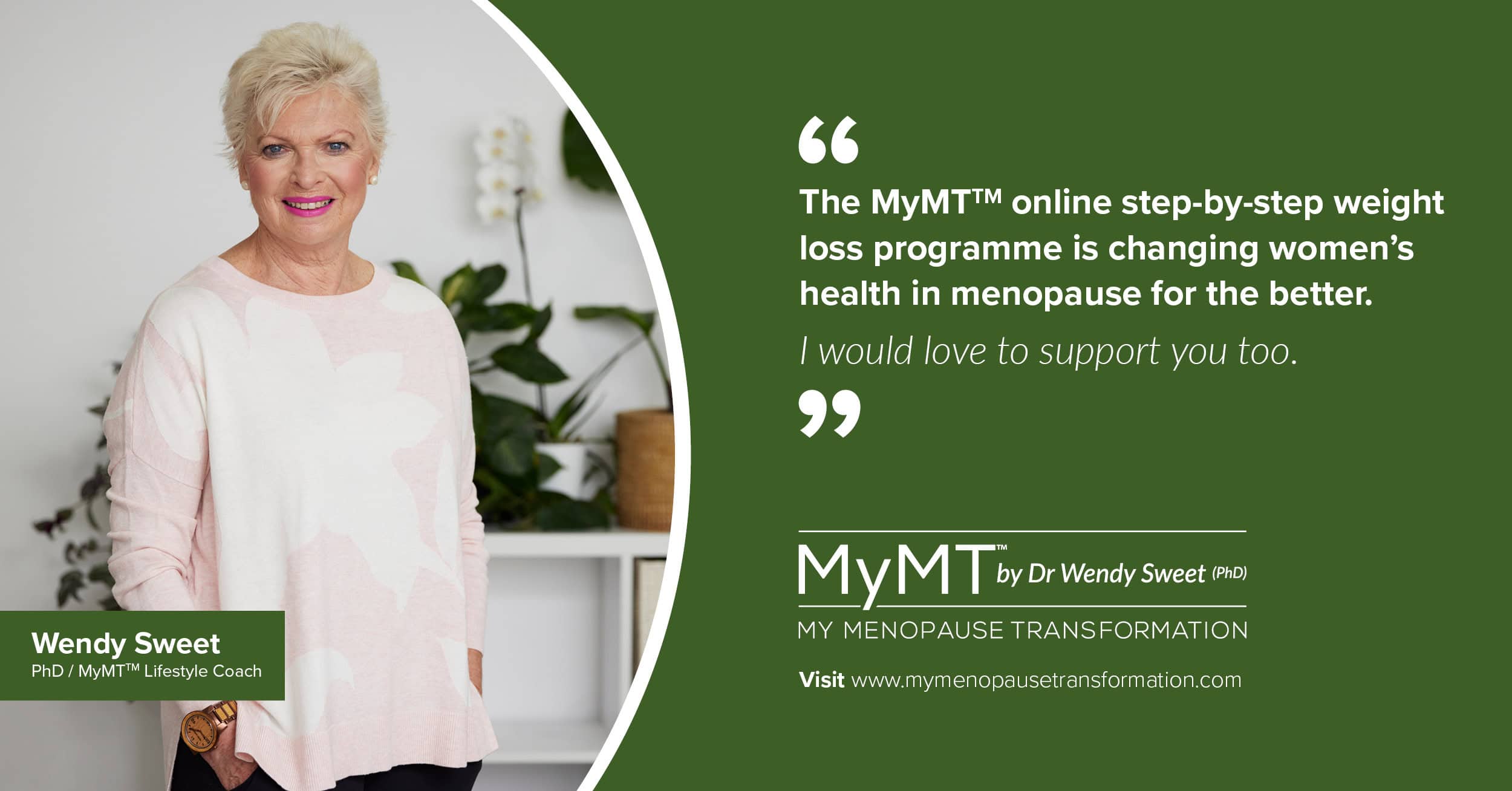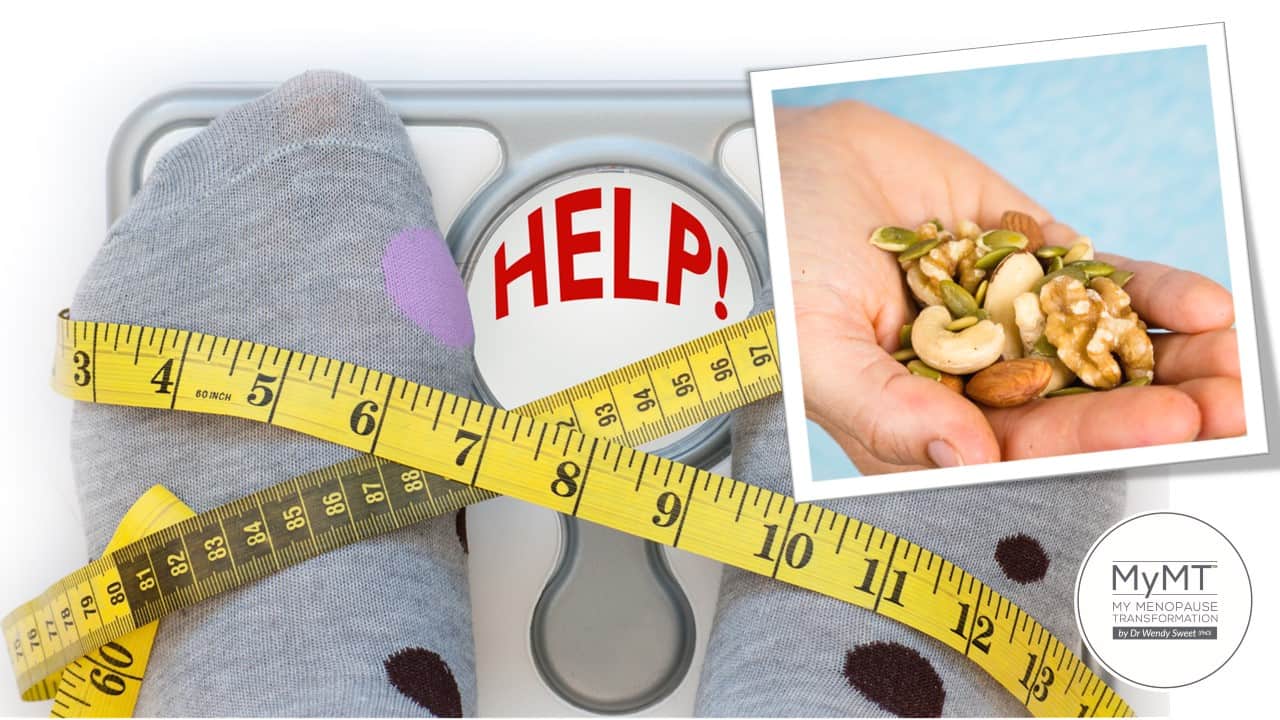Sex, Myths and Menopause – at last this documentary was shown on New Zealand television. It was made over a year ago now by UK Journalist Davina McCall. Like many of us, Davina McCall was confused about what she was experiencing. Turning 44, she didn’t realise she was in peri-menopause and like millions of women, she was confused about her hot flushes, depression, and brain fog.
The documentary was, at long last, busting the taboos about peri-menopause and menopause and would have introduced younger women just entering peri-menopause to the benefits of talking to their Doctor about hormone replacement therapy.
But there was a lot missing from her documentary. And after 8 years of coaching thousands of women on the MyMT™ programmes using lifestyle science evidence specific to this life-stage, I was waiting to hear about inflammatory changes that occur during the menopause transition, especially to our blood vessels, liver and muscles and of course, weight gain.
Peri-menopause is known as a systemic (all-over) inflammatory phase of the life-course [McCarthy & Raval, 2022], so focusing on reducing inflammatory changes through lifestyle change, especially when it comes to brain health is an important change that women can make through nutrition, exercise and sleep.
There was also no mention of Vitamin D status and iron status in women. Those of you who have been with me in my newsletter community for a while, will know that these bloods are important to check as levels change as we move through menopause and into post-menopause.
Once again I noted that this was the neglected dimension of education for women. I also noticed that the women she was interviewing, weren’t overweight or obese.
As I know myself, there is a big difference in response to menopause HRT depending on body-type and whether women have a central (truncal) distribution of body-fat.
Many larger ladies may find that they aren’t suited to having either synthetic or bioidentical oestrogens, and research shows that the mode of delivery of these is an important consideration – especially if women have Non-Alcoholic Fatty Liver Disease [NAFLD].
Like most medical interventions, it’s a case of ‘different strokes for different folks’ which is why, women must have discussions with their Doctor or Endocrinologist if they are pursuing menopause medications.
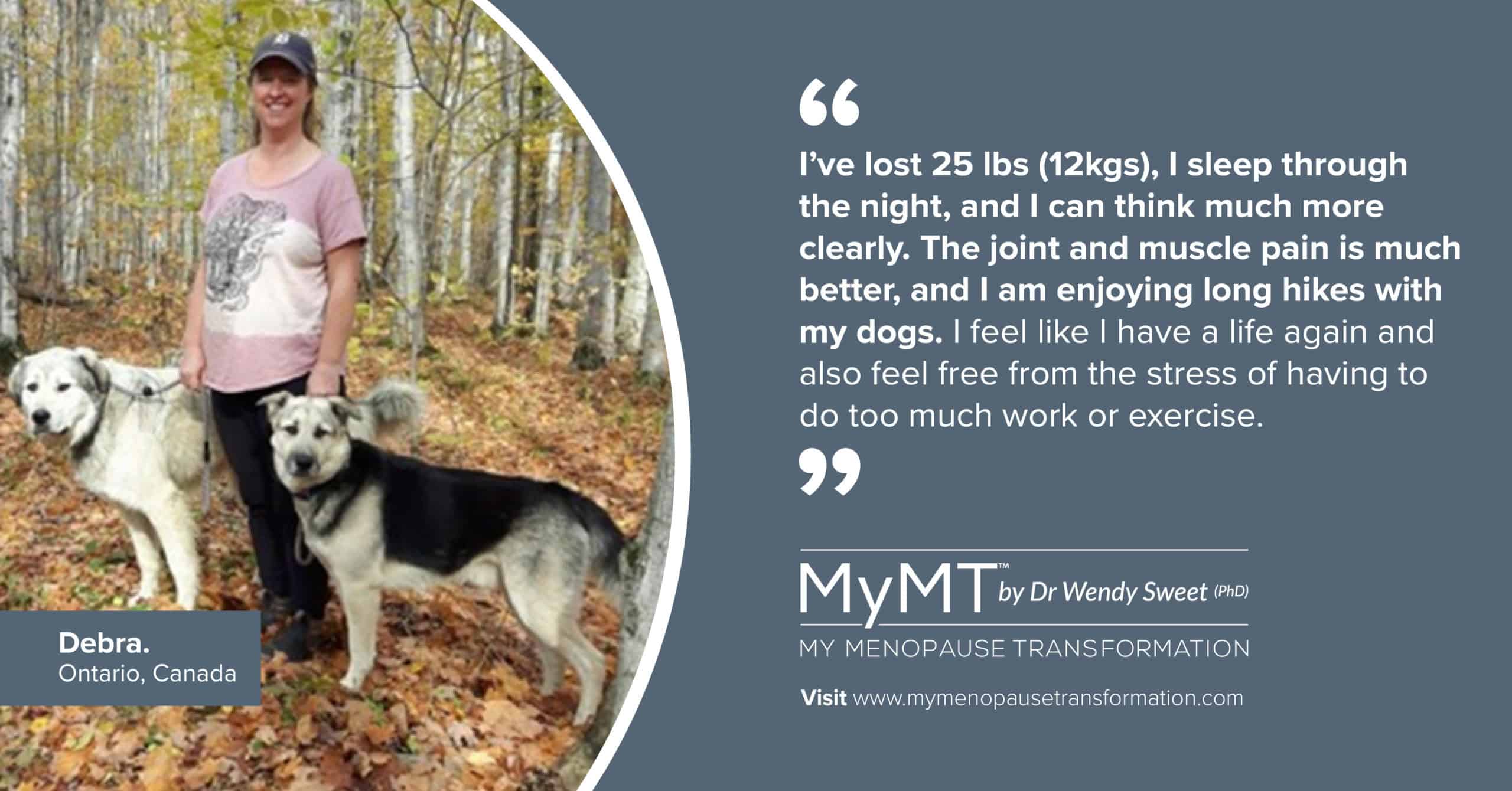
But back to weight management in menopause – the topic of my midweek newsletter today. In New Zealand alone there has been an increase in overweight and obese status in women over the past few years and yes, menopausal and post-menopausal women contribute to these stats.
The Ministry of Health reports a significant increase from 2019/20 to 2020/21 for women (31.9% to 35.9%) and stats are similar in other western countries as well. And the stats in Canada aren’t looking so great either – over half (58%) of the Canadian women aged 40 to 59 years are considered overweight or obese. Evidence also suggests a positive trend with ageing, menopause and weight gain [Jull, Stacey et al, 2014].
Why do women put on weight during menopause? It’s the question that I had to ask myself when I put on 15kg, and yes, I was on HRT. I had no idea at the time that the menopause transition increases numerous women’s susceptibility to weight gain and obesity. This is partly due to liver and gut health changes, but also to the changes going on in our muscle mitochondria (the organelles that help to ‘burn fat’) and changes going on in the size and density of our muscles, a condition known as sarcopenia.
Because our muscle tissue is replete with oestrogen receptors, changes to our muscles as we age are perfectly normal, however, what we may want to do is to slow-down the rate of change. And for women wanting to manage their weight, or to lose weight, then it’s important to understand protein requirements to offset muscle tissue breakdown and to maintain metabolism. Muscles are at the heart of your metabolism, as is the liver.
New research has emerged exploring protein requirements during the menopause transition [Simpson et al., 2022].
This is encouraging, because for overweight and obese women, in my own 12 week programmes I do focus on whether women are having too much or too little protein and try to get them to start with around 1.0gm of protein per kg of body weight per day (1.0gm/kg/day) and move this up to 1.2gm/kg/body weight as they add in their exercise. This should account for around 20%-25% of total daily intake, a percentage that the research suggests as well. [For food sources, see below].
I know that numerous Exercise Professionals and others working in the menopause space, encourage around 30% of the total daily intake of food from protein, however, for women who are overweight and not doing a lot of heavy exercise, then too much protein can stress the kidneys and the liver. [Lonnie, Hooker et al, 2018; Osuna-Padilla et al., 208].
If women are already overweight or obese going through menopause, then a high intake of protein may increase the need for the liver to have a higher turnover of amino acids, especially if women have fatty-liver.
This excess protein then converts to excess energy and storage in fat cells as well as places stress on an already over-burdened liver. This is why I also have a focus on liver health and improved oestrogen clearance for women who are overweight.
Conversely, for those women who are having too little protein in their diet, then this may also contribute to a more rapid rate of muscle breakdown. This is what we are trying to prevent during the menopause transition. When we lose muscle, then this changes our metabolism and we don’t tend to ‘burn-fat’ as efficiently and this loss of muscle may have implications for sarcopenia and osteoporosis further into post-menopause.
“A failure to change the composition of the diet by the introduction of additional protein and removal of excess processed carbohydrates and/or excess fat, may result in an increased energy intake and storage and therefore, increased body weight during menopause.” [Simpson et al, 2022].
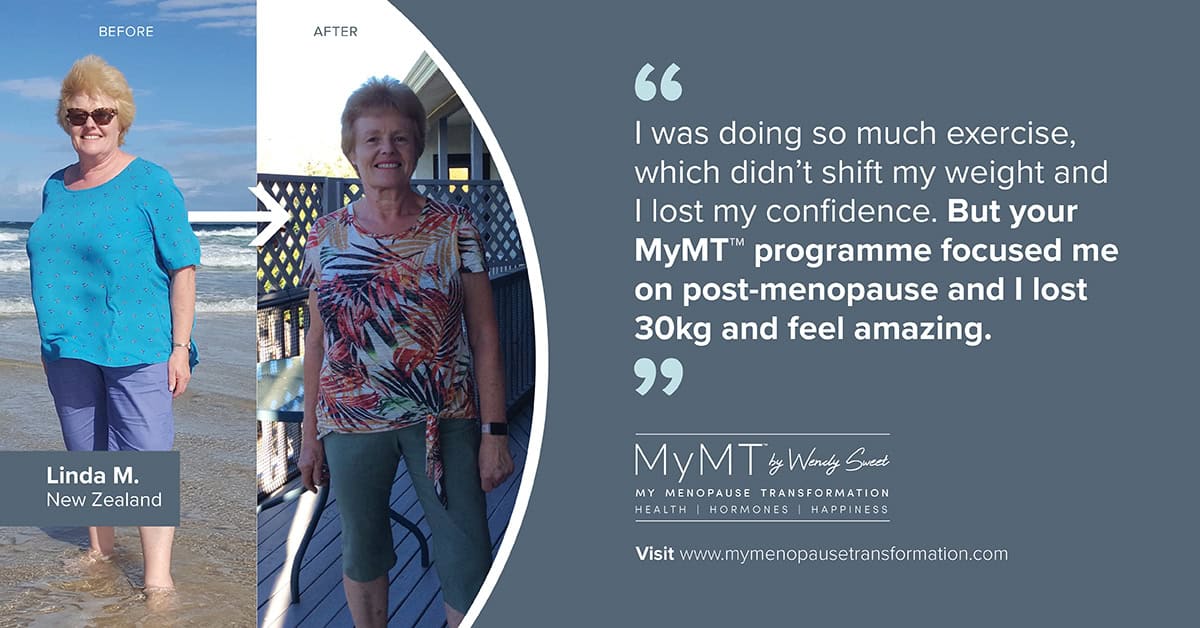
What does the daily protein intake look like for an 80kg overweight woman?
Not all women who are 80kg are overweight obviously, because this total weight includes both muscle and fat tissue as well as bone. But for women who have increased belly-fat and the deep visceral fat that may lead to a condition called Metabolic Syndrome, then 80 grams of protein spread throughout the day might look like this:
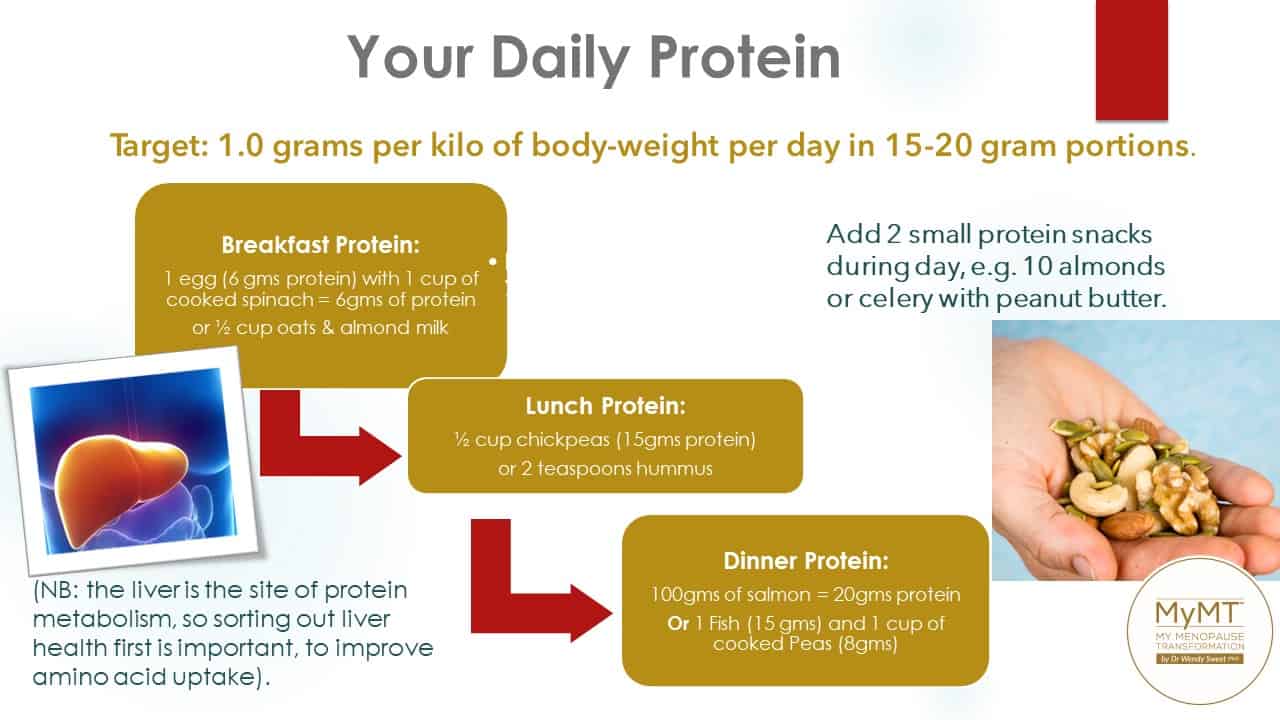
Of course, when we focus on our protein intake (not too much and not too little), then we also have to look at our intake of carbohydrates and fats so that we don’t overeat! This is important in terms of weight loss management, so for those of you who may be on a high fat diet (e.g. Keto) and you are now increasing protein intake, then please be aware that you need to remove some of this fat!
A high protein diet combined with a high fat diet can spell disaster for your liver and gut health as well as your weight. It’s why my focus in the MyMT™ Transform Me programme is on 15-20% total fat intake so that women can lose the deep visceral, storage fat and stop gaining. It’s this deeper visceral fat that sends women into cardiovascular and metabolic chaos, leading them towards poorer post-menopause health.
For overweight and obese women in their menopause and post-menopause transition, weight loss matters to our cardiovascular and metabolic health as we age. I found this out the hard way too. And yes, I know that menopause HRT can make a huge difference to women’s coping skills, there is also so much more that women can do to manage their weight during menopause and the answer lies in changing their lifestyle to help their body adjust to this stage of life.
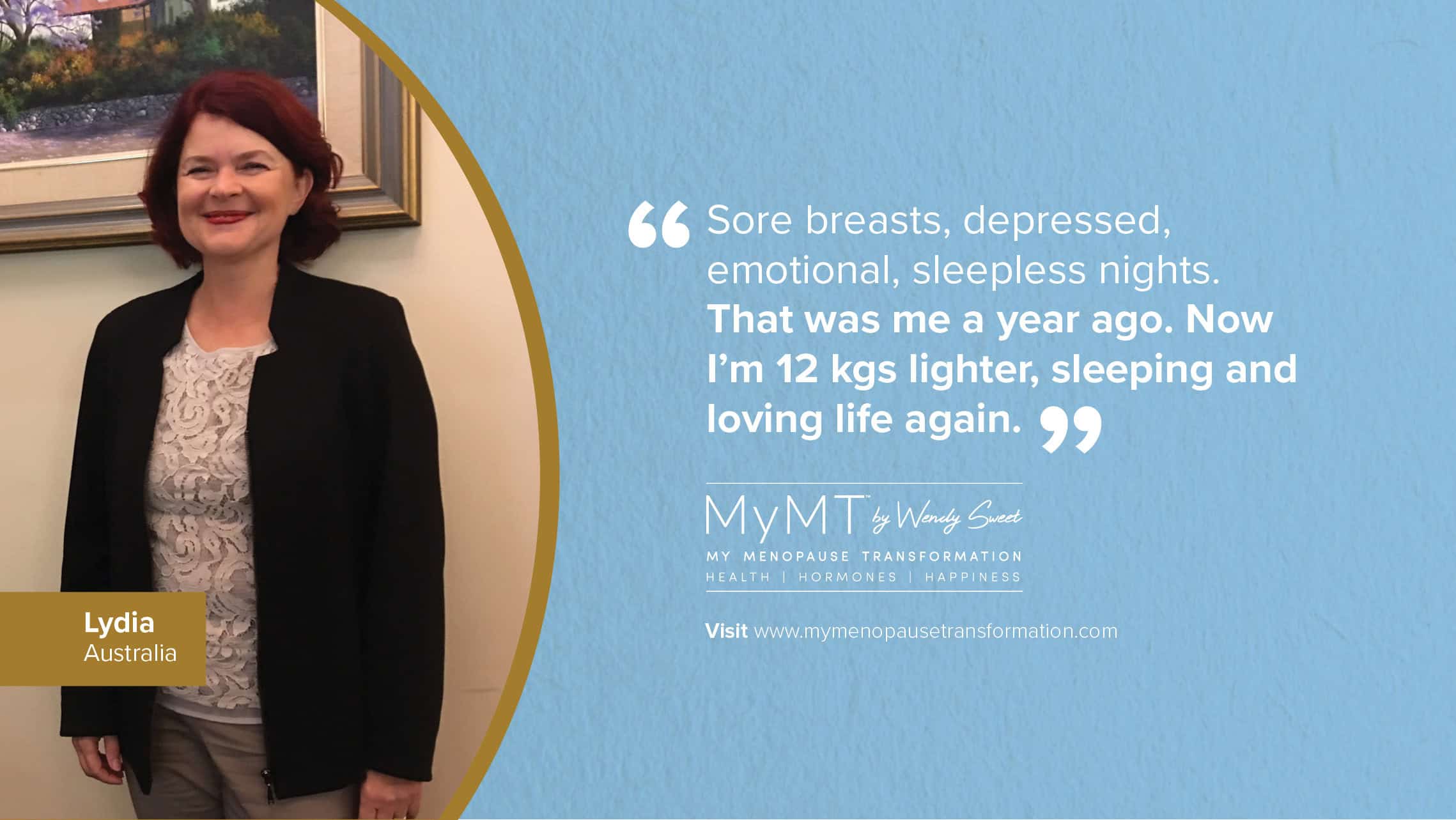
Next weekend, I’m opening up my Visible Results Transform Me January Sale for pre-registration ready to commence anytime throughout January.
Numbers will be limited for this intake as I want to work with women more closely in my coaching community.
If you have found that you are struggling with menopause weight gain, especially abdominal and thigh fat, then I invite you to join me, whether you are on HRT or not. With NZ$100 savings, this price won’t be repeated in 2023. If you are on my mailing list then you will receive emails about this too.
And please note, if you are a Health Professional, then please pre-register for notification about my brand new 6 week online MyMT™ Menopause Weight Loss Coach Certification which will be on sale soon. I can’t wait to share this with you so you can also help overweight midlife women in your community.
Dr Wendy Sweet (PhD), MyMT™ Founder/ Member: Australasian Society of Lifestyle Medicine.
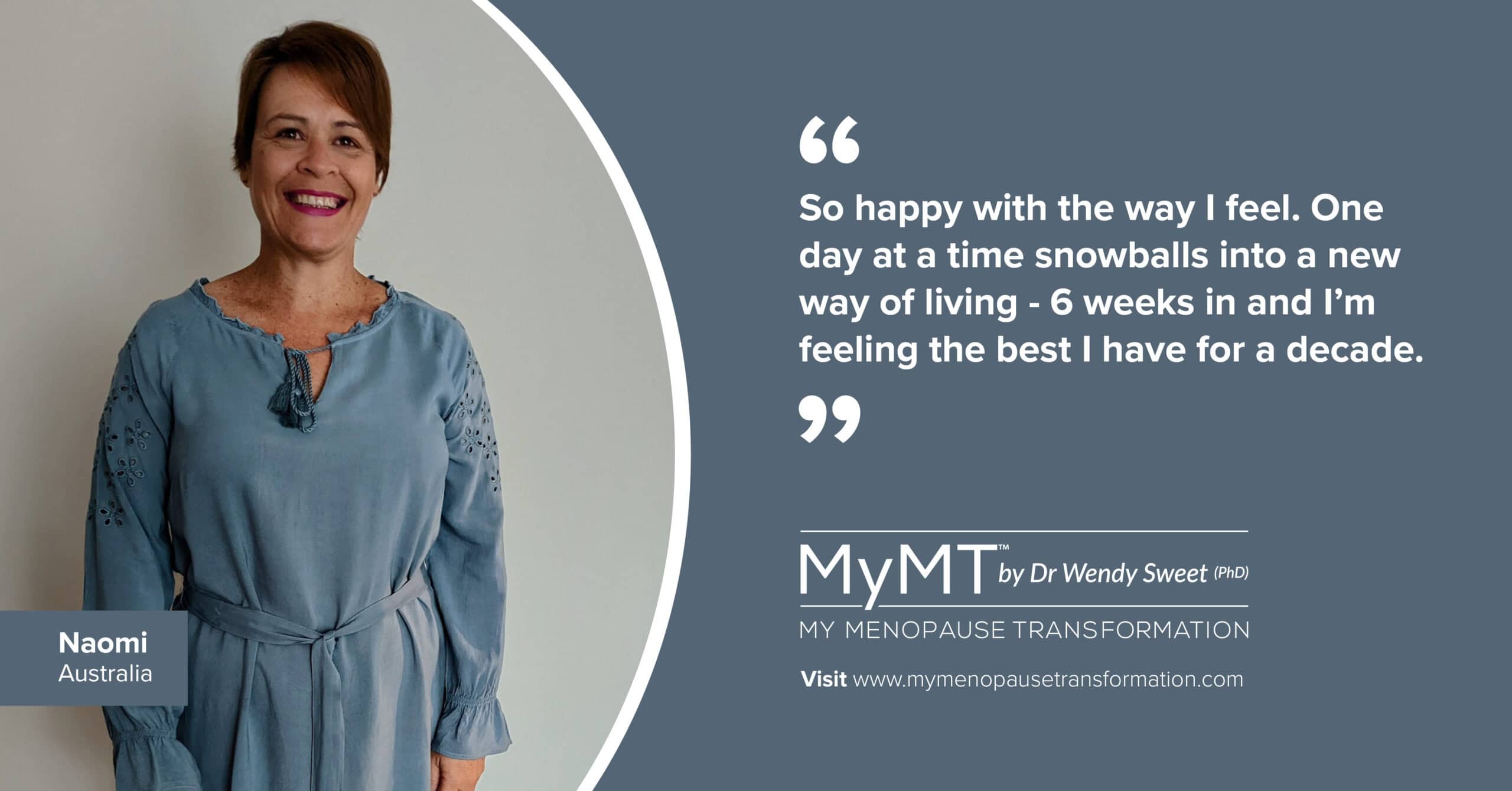
References:
Jull J, Stacey D, Beach S, Dumas A, Strychar I, Ufholz LA, Prince S, Abdulnour J, Prud’homme D. Lifestyle interventions targeting body weight changes during the menopause transition: a systematic review. J Obes. 2014; 824310.
Kapoor E, Collazo-Clavell ML, Faubion SS. Weight Gain in Women at Midlife: A Concise Review of the Pathophysiology and Strategies for Management. Mayo Clin Proc. 2017 Oct;92(10):1552-1558.
Kodoth V, Scaccia S, Aggarwal B. Adverse Changes in Body Composition During the Menopausal Transition and Relation to Cardiovascular Risk: A Contemporary Review. Womens Health Rep (New Rochelle). 2022 Jun 13;3(1):573-581.
Lonnie M, Hooker E, Brunstrom JM, Corfe BM, Green MA, Watson AW, Williams EA, Stevenson EJ, Penson S, Johnstone AM. Protein for Life: Review of Optimal Protein Intake, Sustainable Dietary Sources and the Effect on Appetite in Ageing Adults. Nutrients. 2018 Mar 16;10(3):360. doi: 10.3390/nu10030360.
Osuna-Padilla IA, Leal-Escobar G, Garza-García CA, Rodríguez-Castellanos FE. Dietary Acid Load: mechanisms and evidence of its health repercussions. Nefrologia (Engl Ed). 2019 Jul-Aug;39(4):343-354.
Simpson SJ, Raubenheimer D, Black KI, Conigrave AD. Weight gain during the menopause transition: Evidence for a mechanism dependent on protein leverage. BJOG. 2023 Jan;130(1):4-10.
Stachowiak G, Pertyński T, Pertyńska-Marczewska M. Metabolic disorders in menopause. Prz Menopauzalny. 2015 Mar;14(1):59-64. doi: 10.5114/pm.2015.50000. Epub 2015 Mar 25.
